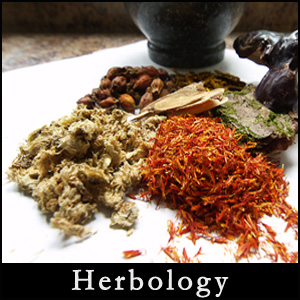|
Herbology:
Herbalism is a traditional medicinal or folk medicine practice based on the use of plants and plant extracts. Herbalism is also known as botanical medicine, medical herbalism, herbal medicine, herbology, and phytotherapy. The scope of herbal medicine is sometimes extended to include fungal and bee products, as well as minerals, shells and certain animal parts. Pharmacognosy is the study of medicines derived from natural sources. Traditional use of medicines is recognized as a way to learn about potential future medicines. |
In 2001, researchers identified 122 compounds used in mainstream medicine which were derived from "ethnomedical" plant sources; 80% of these compounds were used in the same or related manner as the traditional ethnomedical use.
Plants have evolved the ability to synthesize chemical compounds that help them defend against attack from a wide variety of predators such as insects, fungi and herbivorous mammals. By chance some of these compounds whilst being toxic to plant predators turn out to have beneficial effects when used to treat human diseases. Such secondary metabolites are highly varied in structure, many are aromatic substances, most of which are phenols or their oxygen-substituted derivatives...... Continue reading this article at Crystal Links.com/Herbology
Plants have evolved the ability to synthesize chemical compounds that help them defend against attack from a wide variety of predators such as insects, fungi and herbivorous mammals. By chance some of these compounds whilst being toxic to plant predators turn out to have beneficial effects when used to treat human diseases. Such secondary metabolites are highly varied in structure, many are aromatic substances, most of which are phenols or their oxygen-substituted derivatives...... Continue reading this article at Crystal Links.com/Herbology



